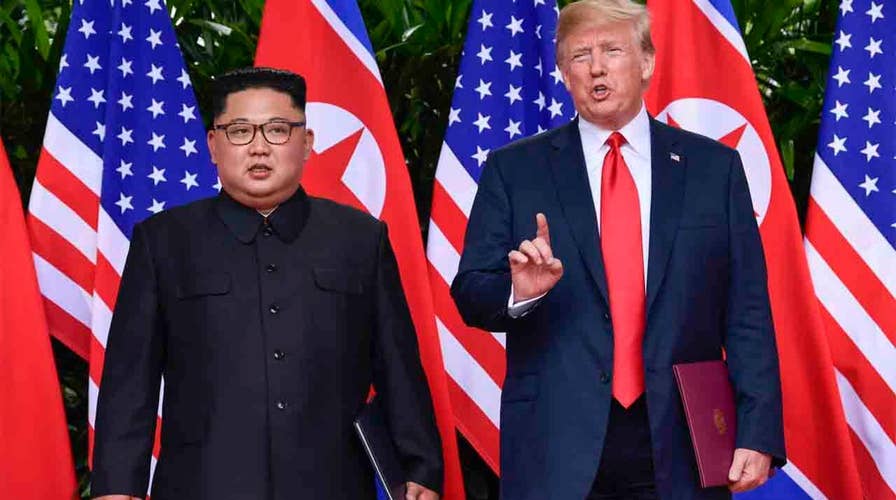North Korea says it won't denuclearize without trust in US
Asia analyst Gordon Chang says North Korea speech at the UN shows no real progress; insight on 'America's News HQ.'
Just hours after President Trump touted his efforts to denuclearize North Korea at a boisterous rally Saturday night, Secretary of State Mike Pompeo told reporters he had a "very productive" meeting with North Korean leader Kim Jong Un in Pyongyang on Sunday.
Although there were no immediate indications the secretary of state had arranged for a second major summit between Trump and Kim, both leaders have publicly voiced support for another meeting.
The jovial feeling during Pompeo's fourth trip to North Korea appeared to be mutual. "It's a very nice day that promises a good future for both countries," Kim told Pompeo through a translator as they sat down for a 90-minute luncheon.
The cordial atmosphere was a marked change in tone from recent negotiations. In July, when Pompeo last visited North Korea, officials there almost immediately decried his “unilateral and gangster-like demand for denuclearization," souring relations between the two countries.
WATCH: NORTH KOREA BUILDING MISSILES DESPITE TALKS WITH THE U.S.
In August, Trump abruptly canceled Pompeo's planned trip to North Korea, saying, "I do not believe they are helping with the process of denuclearization as they once were." Trump cited his tougher trade practices with China as a possible reason for the regime's posture.
But at a rally in West Virginia last week, Trump explained how Kim had turned him around.
"He wrote me beautiful letters, and they’re great letters," Trump told the crowd. "We fell in love.”
"He wrote me beautiful letters, and they’re great letters. We fell in love."
During a speech Saturday night in Kansas, Trump sounded a positive note on North Korea, saying that he had obtained the return of U.S. servicemembers' remains from the country and secured the release of hostages held by the regime without having to pay any real cost.
Trump contrasted his negotiations with those the Obama administration conducted with Iran, which he slammed as "horrible" for including a multi-billion dollar transfer of cash to the country that he said exceeded presidential authority.
Arriving in Seoul, Pompeo tweeted that he and Kim had "good talks" and that they "continue to make progress on agreements made at Singapore summit," referring to the historic June meeting between Trump and Kim that resulted in a vague agreement for the North to denuclearize.
He offered no details and upon landing in South Korea briefed White House national security adviser John Bolton and chief of staff John Kelly on his trip, officials said. Pompeo, on the third stop of a four-leg trip that began in Japan and will end in China, was then to meet South Korea's President Moon Jae-in.
In Pyongyang, Pompeo and Kim met for about three-and-a-half hours, first in a business session and then in a 90-minute luncheon that the North Korean leader hosted at a state guesthouse, according to the pool report of the lone U.S. journalist allowed to accompany the secretary on his trip.
POMPEO SAYS EX-SECRETARY OF STATE JOHN KERRY NOT HELPING AMERICA BY MEETING WITH IRANIAN OFFICIALS
"Yeah, so we had a great, great visit this morning," Pompeo told Kim. "Thank you for hosting, President Trump sends his regards. And we had a very successful morning so thank you and I am looking forward to our time here at lunch as well."
Pompeo had planned to meet with Kim on the trip, but North Korean officials said Kim's participation in the lunch had not been expected. Kim had not met with Pompeo on his last visit.
One U.S. official who accompanied Pompeo said Sunday's meeting was "better than the last time," but added that "it's going to be a long haul." The official was not authorized to discuss the negotiations publicly and spoke on condition of anonymity.
Pompeo had flown to Pyongyang from Tokyo after talks there with Japan's prime minister during which he pledged the Trump administration would coordinate and unify its strategy for denuclearization with allies. Japan has been wary of the initiative, but South Korea has embraced it.
Pompeo has repeatedly refused to discuss details of negotiations, including a U.S. position on North Korea's demand for a declared end to the Korean War and a proposal from Seoul for such a declaration to be accompanied by a shutdown of the North's main known nuclear facility.
The U.S. and Japan have pushed for the North to compile and turn over a detailed list of its nuclear sites to be dismantled as a next step in the process; the North has rejected that demand.
Since the denuclearization effort got underway with a secret visit to the North by then-CIA chief Pompeo in April, there has been only limited progress, even since the June 12 Trump-Kim summit in Singapore that many had hoped would jump-start the effort.
North Korea so far has suspended nuclear and missile tests, freed three American prisoners and dismantled parts of a missile engine facility and tunnel entrances at a nuclear test site. It has not taken any steps to halt nuclear weapons or missile development.
The North also has accused Washington of making "unilateral and gangster-like" demands on denuclearization and insisted that sanctions should be lifted before any progress in nuclear talks. U.S. officials have thus far said sanctions will remain in place until the North's denuclearization is fully verified.
Pompeo said in Tokyo that it was important to hear from the Japanese leader "so we have a fully coordinated and unified view." He also pledged that during his meeting with Kim on Sunday, he would raise the cases of Japanese citizens abducted by North Korea.
The Associated Press contributed to this report.
























